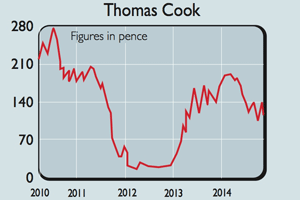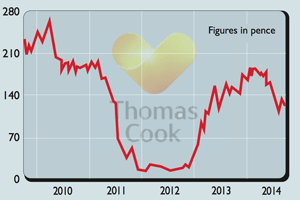Why Thomas Cook collapsed
Thomas Cook has gone bust, leaving stakeholders, politicians and managers all blaming each other.

Get the latest financial news, insights and expert analysis from our award-winning MoneyWeek team, to help you understand what really matters when it comes to your finances.
You are now subscribed
Your newsletter sign-up was successful
Want to add more newsletters?

Thomas Cook has gone bust, leaving stakeholders, politicians andmanagers all blaming each other. Matthew Partridge reports.
Tour operator Thomas Cook, the world's oldest travel group, has declared bankruptcy, triggering a "bitter blame game" over who was responsible, say Alice Hancock and Daniel Thomas in the Financial Times. The company's banks, bondholders, largest shareholder (China's Fosun) and managers "all came in for criticism".
Following the news that bosses had amassed £47m in pay and perks since 2007, Prime Minister Boris Johnson reflected on "whether the directors of these companies are properly incentivised to sort these matters out". For its part, the government has been attacked for refusing to "step in" and help secure its future over the next few months by guaranteeing loans. The 178-year-old tour operator was always going to struggle given the change in the way people take (and book) holidays, says Patrick Collinson in The Guardian. The number of city breaks "now significantly [outstrips] beach holidays".
Try 6 free issues of MoneyWeek today
Get unparalleled financial insight, analysis and expert opinion you can profit from.

Sign up to Money Morning
Don't miss the latest investment and personal finances news, market analysis, plus money-saving tips with our free twice-daily newsletter
Don't miss the latest investment and personal finances news, market analysis, plus money-saving tips with our free twice-daily newsletter
While this shift been good news for Ryanair, easyJet and Airbnb, "with all of their customers booking online", package holiday companies "shackled to expensive high street chains", like Thomas Cook with its 560 outlets, have ended up big "losers". Only one in seven of us now "pop into a high street travel agency to buy a holiday" and those who tend to do tend not to have much spending power.
But that's hardly all there is to it, says The Economist. Far from being in decline, the package holiday "is enjoying a resurgence". The number of Britons going abroad on "inclusive tours" has risen from 14.3 million in 2010 to 18.2 million in 2018. Part of this is down to cost, because "it is still cheaper to buy a family holiday as a package than book the components individually", especially since Thomas Cook and its rival TUI "are able to use their scale to negotiate lower prices" on hotel rooms and flights. The popularity of Love Island has also boosted the number of younger package holidaymakers.
It was the debt wot did it
The internet and this summer's heatwave contributed to Thomas Cook's demise, says Jim Armitage in the Evening Standard. But the main cause was "too much debt", a result of its 2007 merger with MyTravel (see box below). Despite raising "hundreds of millions" from shareholders in 2013, its debts had reached £1.25bn by the start of this summer, requiring it to make £140m each year in interest payments. When your profit before interest is a mere £97m, as it was in 2018, "that's a one-way ticket to somewhere very nasty". Had it not been for record-low interest rates", the company would have gone bust "long ago".
Shareholders now "face total wipeout", says Ed Cropley in Breaking Views, and creditors "won't fare much better". Thomas Cook owned few assets, including only "16 of its 100-odd fleet of planes". So these are unlikely to cover much more than a quarter of claims totalling £1.5bn-£1.7bn.
Where did it all go wrong
Thomas Cook began in 1841 when Derbyshire cabinet-maker Thomas Cook arranged for 500 people to be taken 12 miles by train from Leicester to a temperance meeting in Loughborough, says Zoe Wood in The Guardian. Four years later Cook officially entered the tourist business, arranging train trips from Leicester, Nottingham and Derby to Liverpool for profit. By 1873 it was marketing its first round-the-globe tour "for 200 guineas" (£17,400).
After a sale to the owners of the Orient Express, it was nationalised in 1948. Returned to the private sector in 1972, Thomas Cook was bought and sold by a series of owners, including the group that owned the German airline Lufthansa. However, the "seeds of the company's downfall" were ultimately sown by the decision to merge with MyTravel in 2007, say Oliver Gill and Michael O'Dwyer in The Daily Telegraph. As well as "combining two businesses that, even then, had fallen out of favour and were exposed to the rise of DIY online holiday bookings", it also "ladled billions of pounds of loans" onto a "vulnerable" firm.
By 2011 the company was forced to undergo a "painful restructuring". Over the next seven years things failed to improve, and "investors took flight" in late 2018 after a series of profit warnings. While a further restructuring of the debt temporarily kept it running, the failure of its attempt to find a buyer for an airline with an ageing fleet, as well as a "staggering" £1.1bn writedown on the value of MyTravel, prevented it from getting further assistance from its bankers, forcing it under.
Get the latest financial news, insights and expert analysis from our award-winning MoneyWeek team, to help you understand what really matters when it comes to your finances.

-
 8 of the best properties for sale with minstrels’ galleries
8 of the best properties for sale with minstrels’ galleriesThe best properties for sale with minstrels’ galleries – from a 15th-century house in Kent, to a four-storey house in Hampstead, comprising part of a converted, Grade II-listed former library
-
 The rare books which are selling for thousands
The rare books which are selling for thousandsRare books have been given a boost by the film Wuthering Heights. So how much are they really selling for?
-
 What investors can learn from Thomas Cook's collapse
What investors can learn from Thomas Cook's collapseFeatures Bad decisions and bad debt have led to the collapse of 178-year-old travel company Thomas Cook. John Stepek looks at what investors can learn from its demise.
-
 Thomas Cook’s holiday nightmare
Thomas Cook’s holiday nightmareFeatures High debt, fierce competition and one-off factors have pushed tour operator Thomas Cook to the brink of bankruptcy.
-
Share tips of the week
Features MoneyWeek’s comprehensive guide to the best of this week’s share tips from the rest of the UK's financial pages.
-
 Will Fosun rescue Thomas Cook?
Will Fosun rescue Thomas Cook?Features China’s Fosun International is considering bidding for beleaguered British travel company Thomas Cook’s tour operating division.
-
 Tips update: Thomas Cook
Tips update: Thomas CookFeatures Harriet Green's departure from Thomas Cook has rattled investors in the travel operator. But should it have, asks Phil Oakley.
-
 Shares in focus: Should you take a trip with Thomas Cook?
Shares in focus: Should you take a trip with Thomas Cook?Features Package-holiday provider Thomas Cook has done a good job of turning itself around. So, is it time to get back on board? Phil Oakley investigates.